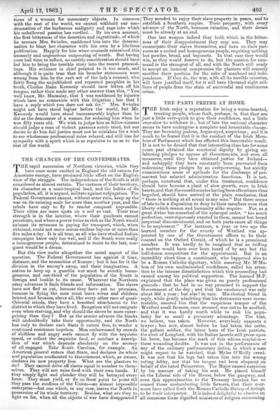THE CHANCES OF THE CONFEDERATES.
THE rapid succession of Northern victories, while they have once more excited in England the old esteem for American energy, have produced little effect on the English view of the struggle. The independence of the South is still considered as almost certain. The vastness of their territory, its character as a semi-tropical land, and the habits of its population, all, it is argued, militate against subjugation. The Federal Government cannot, without utter ruin, keep up the war on its existing scale for more than another year, and the rebels have only to fly to render conquest impossible. Their cities are mere spots on a soil so vast. Their true strength is in the interior, where their gunboats cannot penetrate, and where a power twice as rich as the North would exhaust its revenues in paying for transport, which, when obtained, could not move across endless bayous at more than five miles a day. It is all true, as all who have studied Indian campaigns know only too well, and if the South were really a homogeneous people, determined to resist to the last, con- quest would be a dream.
But this view omits altogether the moral aspect of the question. The Federal Government has against it time, distance, and the necessities of finance ; but it has for it the division in the enemy's camp, and their imagination. A nation to keep up a guerilla war must be strictly homo- geneous, and one-third of the population of the South is foreign and hostile to its cause. Wherever the Northern army advances it finds friends and information. The slaves have not fled as yet, because they have yet no promises, because in flying the men must leave wives and children behind, and because, above all, like every other race of quasi- Oriental minds, they have a besotted attachment to the • district in which they have lived. Bengalees will not emigrate even when starving, and why should the slaves be more enter- prising than they P But as the armies advance the blacks will undoubtedly take their opportunity, and the North has only to declare each State it enters free, to render a continued resistance hopeless. Men embarrassed by crowds of shiftless and angry serfs cannot fly with the requisite speed, or collect the requisite food, or conduct a descrip- tion of war which depends absolutely on the secrecy of all engaged. Take South Carolina, for example. An American general enters that State, and declares its whole serf population confiscated to Government, which, as owner, declares its new property free. What are the planters to do? They cannot drive off slaves equal in number to them- selves. They will not raise food with their own hands. If they simply fight and plunder they will be betrayed every hour. They must yield, or fly on from' point to point till they pass the confines of the Union—an almost impossible enterprise—but one which, in any case, leaves the North in possession of its whole territory. Besides, what are they to fight on for, when all the objects of war have disappeared ? They seceded to enjoy their slave property in peace, and to establish a Southern empire. Their property, with every advance of the North, becomes valueless, and their dream must be already at an end.
One last weapon indeed they hold, which in the bitter- ness of their disappointment they may use. They may emancipate their slaves themselves, and turn on their pur- suers as a united and homogeneous people, requiring nothing but powder, bread, and bayonets. In that case they would win, as they would deserve to do, but the passion for com- mand is the strongest of all, and with the North still ready to accept an immoral compromise the planters will scarcely sacrifice their position for the sake of manhood and inde- pendence. If they do, the war, with all its terrible miseries, will have justified itself, for it will have liberated eight mil- lions of people from the stain of successful and continuous crime.






























 Previous page
Previous page